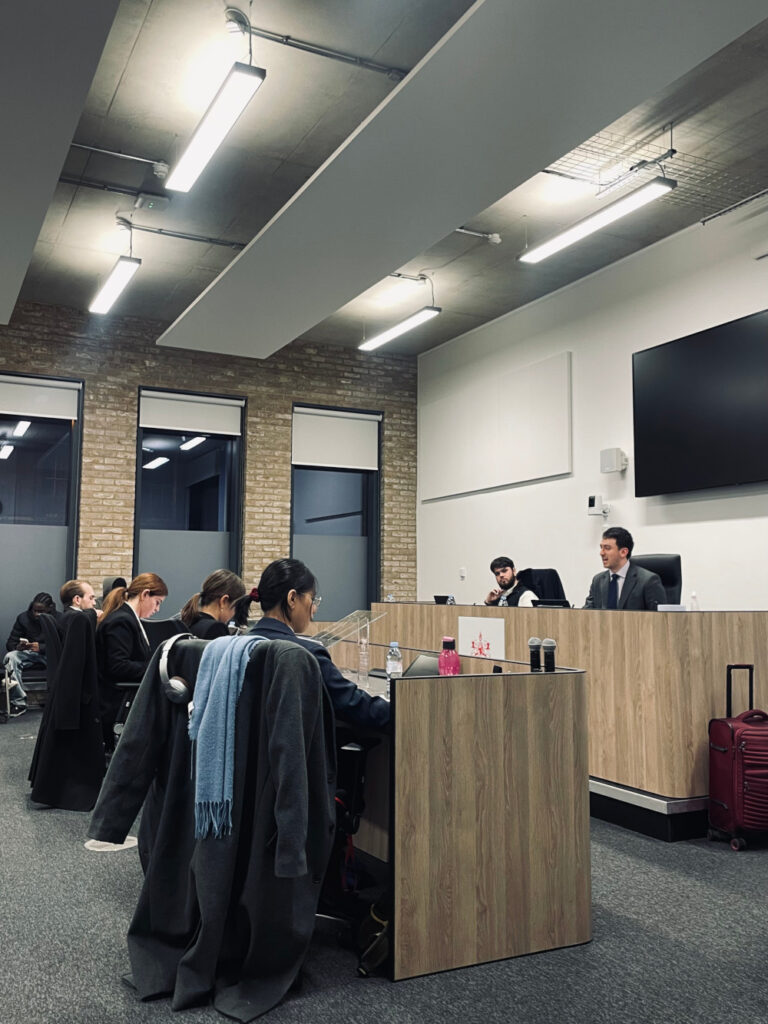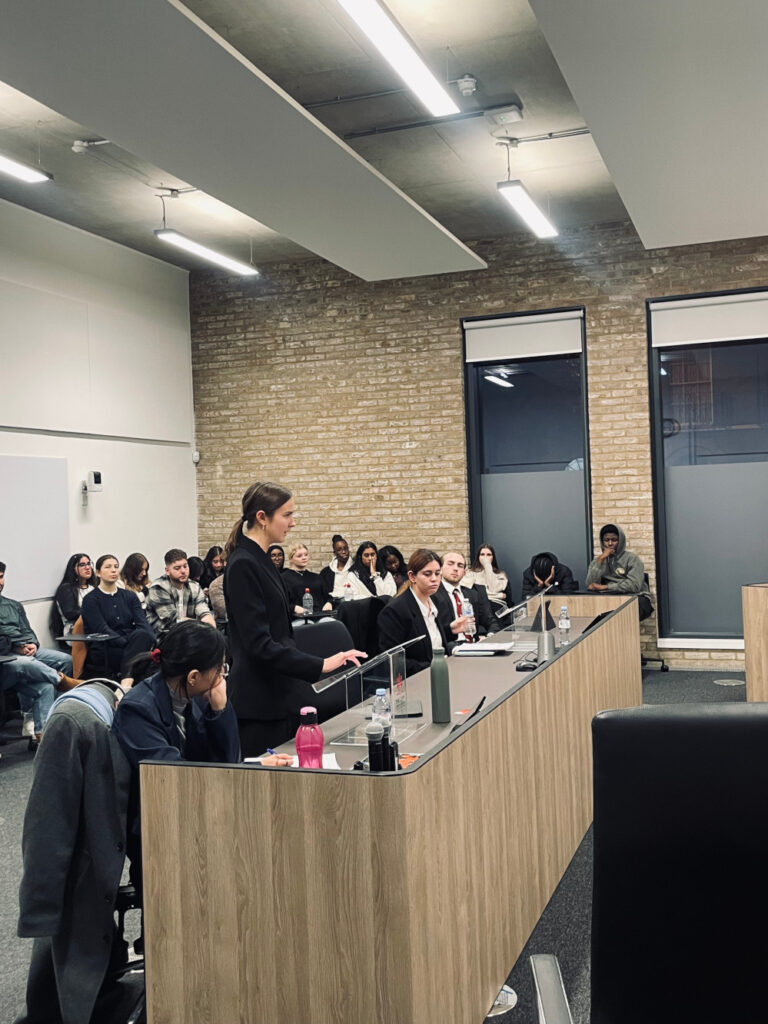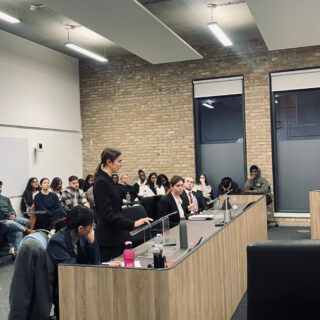Mooting is more than just a hallmark of legal education; it is a transformative experience that hones the skills every aspiring legal professional needs. Hosted by all the City Law School Societies, the recent mooting event at the City Law School provided attendees with an invaluable platform to sharpen their advocacy skills while connecting theory to practice. As someone passionate about a future as an international criminal barrister, I found this event not only enriching, but also reaffirming of the critical role mooting plays in paving pathways to the Bar—or even the solicitor’s route (don’t forget you can become a higher rights qualified solicitor advocate!).
What Is Mooting?
Mooting is a simulation of an appellate hearing, focused on questions of law rather than questions of fact. Participants act as advocates, arguing cases before a mock court. Unlike real trials, the outcome of a moot does not matter as much as the delivery of legal arguments and the ability to address judicial interventions. It provides a unique opportunity to develop key skills such as legal research, persuasive communication, and teamwork.
Advocacy: A Core Skill for the Legal Profession (Personal take-aways)

Advocacy takes many forms:
- Written Advocacy: This is about crafting clear, concise, and compelling skeleton arguments and submissions.
- Oral Advocacy: Success here hinges on clarity, confidence, and adaptability.
- Non-Verbal Advocacy: Effective body language, eye contact, and a professional stance can reinforce your credibility as an advocate.
Each of these forms was on full display at the event, with experienced LLB and BVS students sharing insights on what makes a moot submission truly stand out.
Why Mooting Matters
For those pursuing the Bar, mooting is a direct avenue to mastering the art of courtroom advocacy. It equips you with transferable skills like public speaking, critical thinking, and the ability to work under pressure – traits highly valued in any workplace. Even for those exploring the solicitor’s route, mooting builds confidence and sharpens the analytical abilities needed to advise and negotiate effectively.
Opportunities for mooting abound, both internally and externally. Within the university, mock trials, public speaking events, and workshops provide practice spaces. Externally, opportunities like volunteering in public hearings, participating in national and international mooting competitions, and engaging with other University Law societies offer further avenues to grow.
Key Tips for Mooting Success

- Understand the Problem
Start by thoroughly analysing the moot problem, identifying ambiguities, and breaking down the legal issues. Anticipating counterarguments is essential. - Research Effectively
Build your submissions with solid legal authorities—case law, statutes, and academic commentary. Pay special attention to jurisdictional relevance and recent precedents. - Structure Arguments Clearly
Use frameworks like the IRAC method (Issue, Rule, Application, Conclusion) to ensure a logical flow. Over time, you’ll develop a personalized approach to structuring submissions that works best for your advocacy style. - Prepare for Questions
Judicial interventions are a hallmark of mooting. Anticipate challenges and rehearse concise, confident responses that address the court’s concerns. - Coordinate with Co-Counsel
Seamless collaboration with your teammate ensures consistency in your arguments and strengthens your overall submission.
What Makes a Moot Submission Shine?
During the event, the Honourable Judge James Fraser, a BVS student at the Inns of Court College of Advocacy, provided invaluable insights on the criteria used to evaluate moot performances. His feedback emphasised the importance of:

- Clarity: Are your arguments easy to follow?
- Pace: Are you speaking too fast or too slow?
- Tone and Register: Is your language formal and respectful?
- Legal Analysis: Is your argument supported by solid reasoning and authority?
- Time Management: Can you effectively present your case within the allocated time?
This guidance, along with the outstanding performances from the participants, truly showcased the dedication and skill that go into successful mooting.
The participants, Thomas C. Hills (Senior Appellant), Helen Yaren Usal (Junior Appellant), Laura Stewart Harris (Junior Respondent), and Swann Teh (Senior Respondent), demonstrated exemplary advocacy and legal reasoning. They each brought forward compelling arguments with clarity and professionalism, addressing challenging questions with confidence and poise. Their hard work and preparation were evident throughout the event, as they navigated the complexities of the moot case.
The event’s smooth execution was also aided by Adrian Gutuleanu (LLB3), who managed the timekeeping, ensuring the proceedings ran efficiently and on schedule.
The Road Ahead
For me, the City Law School Society event was not just a lesson in advocacy – it was a reminder of why I chose this path. Mooting is a bridge to a future where I hope to stand as a voice for justice, navigating the complexities of international law. To my fellow law students, I encourage you to seize these opportunities, push your boundaries, and let your advocacy take flight. Whether at the Bar or beyond, the skills you gain will serve you well.
So, what are you waiting for? Step into the moot court, and let your voice be heard. Don’t forget too that Learnmore is the place to go for further tips, tutorials and guides on Mooting.

Many thanks to Mensure Yazici for this review of the mooting demo and guidance event at City. She is a third-year Law student at City, University of London, with a focus on criminal law and justice. Here’s what she says about herself: “My passion for the legal profession extends beyond academics, as I am actively involved in pro bono work and volunteer initiatives that aim to provide legal assistance to underrepresented communities. These experiences have strengthened my commitment to social justice and shaped my ambition to pursue a career as a criminal barrister. Eager to develop my skills and knowledge, I strive to contribute meaningfully to the advancement of the legal field.”

